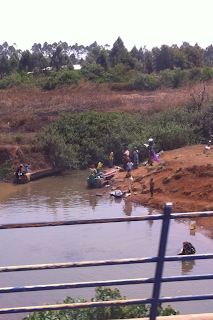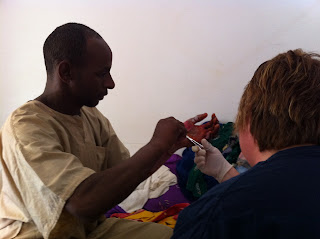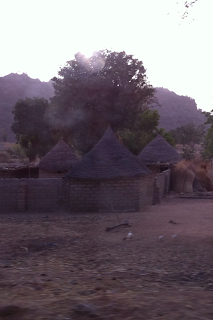The Mission Hospital at Ngaoundere has approximately 250
beds, meaning that it houses about the same number of patients as most
metropolitan hospitals here in America.
Yet there are only 8 doctors and about 100 healthcare workers, half of
which are nurse aides. It is not one big
building like hospitals here, but rather a composite of many smaller buildings
spread over a large complex. There is even a tuberculosis ward that consists of
6 patient buildings each filled with 4 to 6 patients. I think to myself, good at least I can avoid
this area. But in reality they come out
of that ward and up to the Emergency Department to receive their daily
medications. So much for that thought.
In this hospital, the nurses round on patients like
doctors. They write orders for
medications, IV fluids, procedures and lab tests. In some specialty units, a
doctor will round on patients daily, but in most other units perhaps once a
week. In most cases it is the nurse who decides what the diagnosis is and how
to best treat the patient. Now there is a lot of variability in each nurse’s
level of training and experience.
Sometimes the diagnosis is incorrect and other times the wrong treatment
is given. Tests ordered by the doctor or nurse, must be performed by the nurse
or nurse aid. If a spinal tap or ultrasound is needed, the nurse must do
it. If blood work is ordered, the nurse
must draw the specimen and take it to the lab.
Doctors complain that the nurses give no care, but the biggest reason
for this is that it the nurses are too busy practicing medicine.
In this country the family does most of the cares for their
patient and also gives them their oral medications. There is no standard of care and each family
cares for their loved one as best they can, but often they do not have the
knowledge to do it right. There is no
linens provided by the hospital, so if the family does not provide a sheet to lie
on the mattress, then the patient will be placed on the bare plastic. The
family is responsible for cooking for the patient and for cleaning them
up. Most rooms at the hospital have beds
for 4 patients, and many family members stay in the room with them the whole
time. So in a typical ward in any given
room there are usually 20 plus people staying in there. On the hospital complex there are a couple of
cooking houses where families prepare food and a water spigot and large rocks
for them to wash dishes and do laundry.
Definitely not an American laundry mat! Having the family provide the care has been
the custom in this country for many decades and I don’t see that changing soon.
Our mission there is to help them to better function within their own means.
And rather than insisting that the nurse give all of the cares, much can be
gained just by teaching families what to do and by telling them what is
expected.
There is no health insurance here and before any treatments
or medications can be rendered, the family must first pay for it. It does not matter if the patient is near death
from a low blood pressure that can likely be fixed right away with IV fluid
bolus’s, no treatment can be given prior to the family paying. Nothing is
supplied for free or included in the room charge. If it is an IV that is needed, they must buy
not only the IV fluids, but also the needle and tubing to infuse it with. It is
hard to stand by, waiting and wondering if the family will come up with the
money. Sometimes one is just compelled
to reach into your own pocket to come up with the few dollars it costs to begin
life saving treatment.
This trip although short was very busy and despite the time
crunch we were able to accomplish many things.
Steph was able to train over 100 healthcare workers in basic life
support, helped organize the store room and somehow managed to get them to type
out an entire list of the supplies there, trained ambulance workers to be
better prepared for emergencies and was even able to go on an actual ambulance
run with the crew. She also spent some time working in the Pediatrics ward
(can’t keep her away from the kids) and somehow also found the time to help out
with the massive amount of burn care we had to perform every day.
I spent most of my time working with and training nurses in
the Burn Unit and ICU. In our time there
we treated patients with burns, strokes, heart attacks, gastrointestinal
bleeds, active hepatitis, malaria, tuberculosis and AIDS. Many of these patients we would be caring for
in full body armor at our hospital, but there is no such thing as isolation in
this hospital. No negative air flow rooms, no gowns, masks or face shields.
Gloves were our only protection.
Culturally medical illness is treated very differently in Cameroon. My own practice of preparing families for the
worst, yet hoping for the best is not in their mind set. Even though you think it likely that their
family member might die in the night, it is taboo to tell them so. Also if a
family does not have the money to treat AIDS, then to diagnose the patient with
this disease is to sentence the patient to death. So a husband might die with a diagnosis of
pneumonia and even his wife does not know that it was AIDS that killed him and
that she likely has it too. I haven’t
checked lately but I think the average deaths from AIDS in this country are
reported at around 17%. That number is
likely low due to the appropriate diagnose never being made.
Much of my visit was planned to evaluate how departments we
have helped them re-model or build in the past are functioning and to assess
the overall operation of the hospital from the ground level. It can sometimes be easy for them to prepare
administrative reports that make things appear better than they are. Some things are going well, but many problems
continue to exist. Workers are not being paid on time, and sometimes not at
all. There are big disparities in how
they are paid, and it has little to do with the job they perform at the
hospital and more to do with what tribe they are from. Tribalism, like families
delivering most of the care, seems likely that it will go on forever. This holds them back in so many ways and I am
discouraged because how can they progress if they refuse to move forward.
They lack basic equipment like stethoscopes, blood pressure
cuffs and thermometers. Supplies of
gloves and dressings are very limited. X-RAY
and ultrasound equipment is in poor shape, much of it very used and too old to
find replacement parts. More training is needed for nursing staff, managers and
bio-medical technicians. Administration tends to deal with any and all problems
by shuffling all workers around within the system and therefore it is hard for
any of them to become truly good at any specialty. The needs remain great, and
so now the next step is to make on going plans for how to best spend time and
money and figure out what supplies will best help them in the future.
Plane schedules from
the north to get us back to Douala did not work at all with our departure back
to the USA, so we had to take a very long, overnight train ride to Yaoundé, then
rush to the bus station with all of our luggage crammed into a taxi along with
us and then wait for the next bus to take us to Douala. We paid extra to get on one of the supposed
nice buses only to find that the air conditioning stopped functioning as soon
as it started moving. Another 5 hours in
sweltering humidity and heat on that bus and then another taxi ride with all of
our luggage to get to the hotel. We had pulled
out of the train station at 620 PM the night before and did not arrive at the
hotel until after 2 pm the next day, we were wringing wet with sweat and totally
exhausted.
After checking in, we celebrated brushing our teeth with
actual running water and showered.
Despite that our feet were still black, so we decided to go soak in the
pool awhile. For sure this hotel looked
at least ten times better on the way out than it had on the way in! This was Saturday night and our plane did not
leave until one AM on Tuesday. We hired
a taxi driver recommended by a former missionary and drove to Limbe to see the
black beaches. Beaches created by the active volcano known as Mount Cameroon. Today the mountain is obscured by clouds as
it often is, so on the drive, we can’t see the mountain. The sand was definitely black and a sight to
see. The amount of garbage being washed
ashore was not so pleasant, but hey we found lots of sea shells because nobody
seemed interested in picking them up there.
The humidity all along the coast is almost unbearable at
least for me, but we made a day of it and saw a lot of the country that I had
never seen before. We saw banana
plantations and others filled with rubber trees. They are tapped for rubber much like trees
around here are for maple syrup. Pretty
interesting because I never before realized that rubber actually came from
trees. Along the way we also saw sand
extractors who took large canoes up the river and filled them with sand, and
then brought it back by the boat load to near the highway so that trucks could
easily pick it up, Coming from such an
industrialized nation it surprises me how much physical labor is required for
such common products.
Without question, to perform this mission, we endured many
hardships, totally left our comfort zone, faced miserable conditions,
unbearable travel and at times dangerous situations, but for certain we grew
stronger in our faith. We hold tight to our children, the dogs, and our
families, somehow loving them all even more than you did before. We are more appreciative of all that we have
and are thankful for the talents and opportunities that we have been given.
The only thing that I can compare it to really is child
birth. You somehow forget all that was
so bad about it and are left mostly with what was good. You remember the smiles of the people you
were able to help, the friends you made, and the beauty of this land located in
the midst of so much hopelessness.
We have been back at home for a couple of days now and we
take pleasure in all the comforts that we have here. I think I am still
brushing my teeth like every 2 hours, just because I can. We have heaters for when we are cold, air
conditioning for when we are too hot, fresh water to drink, reliable
electricity and internet connections. If
we want to go someplace, we need only walk to our car and drive and can be
pretty certain that we will get there. If we are ill we can get the best
medical care regardless of our ability to pay for it. The differences in our nations are pretty much
the exact opposite. They live in the
land of too little and we live in the land of too much.
For sure a journey such as this makes one much more
appreciative of all that you have and all that you typically take for
granted. It opens your eyes to see a
world that is so much bigger than just us and helps you to see that coming from
this land of plenty that there is more that we as individuals and as a nation
could be doing to help others. Whether
it be our neighbors that live right next door, or the homeless and hungry right
here in our own country or those who are underserved in other parts of the
world, we should all try to do something more than just talk about helping
out. By suffering very little, there is
much that we can accomplish.
View of the palms at the botanical gardens in Limbe, Cameroon.
A restaurant along the way in DoualaVegetables for sale in the market.
Washing laundry in the river near Garoua.






















